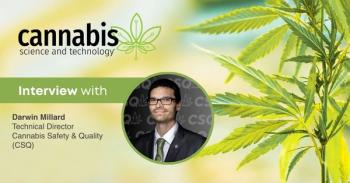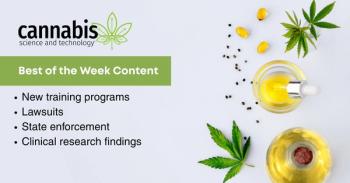
Cannabis Science and Technology
- March 2021
- Volume 4
- Issue 2
Quality Matters: A Chat with Keystone Labs President, Jodi McDonald

Keystone Labs is an accredited testing facility with a good manufacturing practice (GMP) establishment license. Jodi McDonald, president and founder of Keystone Labs, based in Edmonton Alberta, Canada discusses their role in the industry.
Jodi McDonald is President and Founder of Keystone Labs, founded in 2005 and based in Edmonton Alberta, Canada. Keystone Labs is an accredited testing facility with a good manufacturing practice (GMP) establishment license. Keystone Labs offers a full array of analytical and microbiological testing services for pharmaceutical, biotechnology, medical device, nutraceutical, cannabis, and related industries.
Can you give us a brief overview of how you became involved in this market?
Jodi McDonald: Keystone Labs opened its doors in 2005. We’re a third-party test laboratory based in Canada, supporting testing for regulated health products, including cannabis. When the regulations began to shift from people being able to grow their own product, to looking at commercially available products, we started to get calls from folks who were growing cannabis for people who, under our legislation at the time, weren’t able to grow it for themselves. We were getting between 50 and 100 calls a week, asking if we would support the testing that they were going to be required to do to enter the commercial legal system being rolled out in Canada.
After about eight months I could almost script the calls as they came in. Under our older pharmaceutical facing model, if somebody approached us and asked us to do testing for their specific product, we would charge back all of the method development and validation work to each individual client. But these folks, who were growing plants in their basement, couldn’t afford the cost of doing method development and validation work. What they really needed was an off-the-shelf product—a pre-packaged testing service. So, I ran some math and decided that as long as I could make back the investment on our side for developing a method and doing validation work, then that was something that we should think about doing. So, it was probably early 2013, and we began the license application process here in Canada. It took us almost a year and a half to navigate the whole licensing framework to get our license to do medical cannabis testing. And we haven’t looked back since.
When you decided to move forward, were there many other testing labs up and running at the time?
McDonald: No, I don’t think there were. There were no legal testing labs available across the country. And I’m sure it would be similar to what’s going on right now in the US, or even five years ago, pre-Colorado. There were labs who could give people an idea of what potency looked like, but that’s really all anybody was worried about, before cannabis started moving into a legal space. There were a couple of labs across Canada who were doing legal testing, but they were closely associated with the federal program.
Where are the company’s current operations, Canada only?
McDonald: Keystone Labs is a Canadian company and our headquarter are here. But we also have a US partner with a number of labs in Oregon and another lab in California.
Is the idea to have a US partner because the US is beginning to open up?
McDonald: You would think the strategic answer to that would be yes, but it’s actually no. About two years ago, Health Canada was becoming more heavily regulated regarding the requirements for safe products in Canada. And that meant upgrading our testing capabilities. So, we needed to look at strategic ways to expand our test capabilities, expand the footprint of our current lab, and increase our staff. Our US partnership allowed them a footprint in Canada, which helped us grow as well. It was a strategic win for both of us.
You have a lot of Agilent instrumentation in your lab. Is there a reason why in the beginning you looked at Agilent? Did you look at others?
McDonald: In my experience as a third-party lab, we look at every opportunity to maximize our capabilities. So, when we were looking at the instrumentation requirements for ensuring we could meet all of Health Canada’s requirements for testing, it was Agilent that had the most comprehensive offering. They were able to help us outfit our new lab with all of the required equipment for Health Canada, whereas if we had gone with other vendors, we would’ve ended up with capability gaps, and would’ve had to fill them with different vendor instrumentation. I’ve also had a long and trusting relationship with Agilent, the support that we receive, remotely and onsite, is second to none. We’re only making money when we’re running tests, so if the equipment goes down, we need to be able to get it back up and running very quickly.
What are some of the ways the global pandemic has impacted your business?
McDonald: Early on we saw a big decrease in all channels of our business. In the early days our clients were trying to navigate the new requirements for social distancing, or if they weren’t an essential service, trying to figure out how to deliver products and services in a way that met the requirements for isolating and social distancing. But we’re now starting to see it pick up as clients have implemented procedures in-house and can continue, not business as usual, but business that meets the requirements at this time. In our own lab, we’re lucky we have a whole technical team that works in the lab, but we also have quite a bit of lab space, so social distancing was not a big challenge. We didn’t have to worry about going to a shift work model. And our quality assurance and administration groups are able to work from home, coming onsite only when absolutely necessary. So, we’ve been able to continue, and at the same time ensure our employees are safe.
What are the opportunities in the US as the cannabis market grows?
McDonald: Currently in the US, cannabis remains illegal at the federal level. Each state that has legalized cannabis either for medicinal or recreational use has its own set of regulations and requirements. Even our US partners that operate in several states have to look at each state individually. There may be lessons learned from each state, but the regulations for licensing are different. Until there is a cohesive regulatory framework in the US, Keystone's best opportunity for growth probably would be into the European marketplace, and also potentially Australia and New Zealand.
Keystone has a good manufacturing practice (GMP) establishment license. As GMP protects quality in a proactive manner, how do you see this evolving as the industry grows?
McDonald: GMP may be a little heavy-handed for the recreational market, but there are elements of GMP that, should a company be willing to commit to a GMP culture—to produce products that are safe and consistent—would be more efficient in terms of production and quality control over the long term. The companies that are focused on consistency and product safety, are the ones who are setting the bar, and they’re the ones who have clients return over and over.
There is GMP and EU-GMP. For quality to be maintained worldwide, do you think that there needs to be a universal standard for cannabis?
McDonald: That’s an interesting question because GMP is about process and so, even the small differences between GMP and EU-GMP don’t address the fundamental problem that the cannabis industry is seeing, and that’s how do we define what a quality product is? If we use the pharmaceutical framework as a way to look at what’s working well, and what may be missing on the cannabis side, in the pharmaceutical model we have a monograph that describes the product quality. If you’re outside of the specifications, the quality standard may not be met. Currently in the cannabis industry, that monograph for product description is missing. There are groups working on standardizing what a cannabis monograph would look like, and that would include methods being used, or what the criteria for a validated method might look like. That is missing worldwide, we also don’t have that in Canada, and obviously not in the US. The Netherlands has a monograph that some European countries refer to, so that’s a start.
How do different GMP standards affect import and export?
McDonald: From a test perspective there are a couple of big differences. One, the different pharmacopeias have different quantity requirements for testing. That definitely plays into decision making for the production facility, but it also changes how the lab handles product as it comes through for testing. And then the specifications in some cases are easier or more difficult, depending on the pharmacopeia requirements being addressed. In Canada, the federal government allows the choice about which test standard to follow, or which specifications will be used to release your product. Some of what we’re seeing at the moment is a patching together of the best choices for each product facility. So, sometimes it’s a blend of European pharmacopeia requirements with US pharmacopeia requirements. In the future, if there were to be universal integration of GMP standards for cannabis testing, this would most likely improve global trading procedures, and help the industry leap forward.
About the Author
Greg Kozadjian works in Emerging Markets Business Development at Agilent Technologies.
How to Cite this Article
G. Kozadjian, Cannabis Science and Technology 4(2), 48-49 (2021).
Articles in this issue
almost 5 years ago
Hemp Testing Insanity III: This Time It’s the USDA!almost 5 years ago
Quality Control Checkpoints in Cannabis Processingalmost 5 years ago
Why Does Leaf Temperature Matter in a Commercial Grow Room?almost 5 years ago
Around the World: Canada’s Footprint on the Cannabis IndustryNewsletter
Unlock the latest breakthroughs in cannabis science—subscribe now to get expert insights, research, and industry updates delivered to your inbox.



